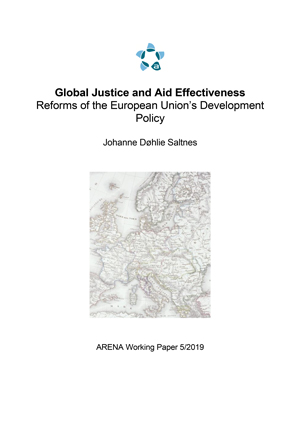 In this paper, Johanne Døhlie Saltnes recasts the story of the like-minded’s intermediate resistance and subsequent acceptance of the EU’s aid effectiveness reforms from one of competing interests and identities to one of contestation over the normative principles that should guide aid effectiveness reforms. The paper draws on the GLOBUS conception of justice as impartiality to conceptualise central elements of the EU’s development policy, and further on the concepts of justice as mutual recognition and justice as non-domination to understand the like-minded’s resistance to the EU’s approach. The paper further highlights the usefulness of applying a global justice perspective when studying the EU’s development policy, as it facilitates a move beyond so-called ‘idealist motivations’ for aid and creates analytical standards that nuance our understanding of the competing normative claims that donors make in their aid policies.
In this paper, Johanne Døhlie Saltnes recasts the story of the like-minded’s intermediate resistance and subsequent acceptance of the EU’s aid effectiveness reforms from one of competing interests and identities to one of contestation over the normative principles that should guide aid effectiveness reforms. The paper draws on the GLOBUS conception of justice as impartiality to conceptualise central elements of the EU’s development policy, and further on the concepts of justice as mutual recognition and justice as non-domination to understand the like-minded’s resistance to the EU’s approach. The paper further highlights the usefulness of applying a global justice perspective when studying the EU’s development policy, as it facilitates a move beyond so-called ‘idealist motivations’ for aid and creates analytical standards that nuance our understanding of the competing normative claims that donors make in their aid policies.
This paper was first published as Globus Research Paper 3/2019. It is part of the project ‘GLOBUS – Reconsidering European Contributions to Global Justice’ which has received funding from the European Union’s Horizon 2020 research and innovation programme under grant agreement no. 693609.
Available at: https://papers.ssrn.com/sol3/papers.cfm?abstract_id=3462413